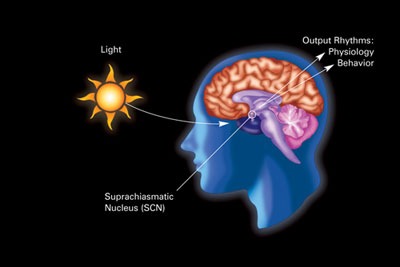Have you ever noticed being energized and drowsy around the same times every day? If you do, then it is because of your circadian rhythm. Basically, your circadian rhythm is a 24-hour internal clock that runs in the background of your brain. It rotates between sleepiness and alertness at fixed intervals. Your circadian rhythm is also your sleep and wake cycle. Let us know more about circadian rhythms and your internal clock.
What are Circadian Rhythms?
Aside from the meaning above, circadian rhythms also pertain to the physical, mental, and behavioral changes that follow a daily cycle. They usually respond to light and darkness in an organism’s environment. One example of a light-related circadian rhythm is sleeping at night and being awake during the day. Circadian rhythms are not just found in people but in most living things as well such as animals, plants, and other tiny microbes, and its study is called chronobiology.
Our circadian rhythm causes our level of wakefulness to rise and dip throughout the day. For example, most people usually have the strongest desire to sleep between 1 pm and 3 pm and then again between 2 am and 4 am. However, it still depends on person to person, that’s why there are those who are referred to as “morning people” while others function best at night.
Your circadian rhythm works best when you have regular sleeping habits such as sleeping at night and waking up in the morning around the same time every day. However, when things like jet lag, daylight savings time, or anything gets in the way and keeps you up into the wee hours of the morning, your circadian rhythm may be disrupted, which can make you feel out of sorts and make it difficult for you to pay attention.
Circadian rhythms also change as people get older. It means that when you get old, you may not have the same sleep/wake cycle as your partner, child, or parents. But the secret is to pay more attention to your body and notice the feeling of alertness and drowsiness. Because the more time you spend developing good sleep hygiene habits, the better your sleep will be, making you feel better as well.
What are Biological Clocks and Are They the Same with Circadian Rhythms?
Biological clocks are our innate timing device. These clocks are composed of specific molecules or proteins that interact in cells throughout our bodies. They can be found in nearly every tissue and organ. Biological clocks are not the same thing as circadian rhythms but they are related. It’s because biological clocks produce circadian rhythms and they are responsible for regulating their timing.
Factors that Disrupt the Circadian Rhythm and Internal Clock
As mentioned earlier, there are some factors that may get in the way of our internal clock which can disrupt our circadian rhythms. This can happen in different reasons or scenarios. Sometimes, it’s the things we do to ourselves that disrupt our normal rhythms, and sometimes it’s because of other factors like biology or genes. Here are some of the factors that can disrupt the circadian rhythm and internal clock.
Environmental Disruptions
-
Jet Lag
Going to a different country on the red-eye is one of the best examples of how our own clocks can be disrupted. When we have jet lag, we usually feel disoriented, foggy, and sleepy at the wrong times of the day. It’s because after changing time zones, our body clock tells us its one time and the outside environment tells us it’s another.
Did you know that jet lag can be considered one type of circadian rhythm disorder? But no worries because it can be treated by allowing your body to adjust to the new time. It may just take several days for external cues, like light, to help your internal clock catch up or fall back with the new cycle.
-
Shift Work
Working on different shifts is another example of how our circadian rhythms can be disrupted and it can also lead to a circadian rhythm disorder over the long term. People who work during the night usually have a hard time with their sleep patterns, causing them to feel sleepy at work or experience insomnia during the day. Aside from that, other systems in our bodies can also feel the effects which can be chronic. It can also lead to weight gain or metabolic changes.
Biological and Genetic Disruptions
-
Rhythms of the Heart
The heart is one organ that can keep time by itself but to some degree, it also relies on the brain’s biological clock for cues. Medical practitioners and researchers have noticed that heart problems like fatal arrhythmias usually occur at certain times of the day, both early morning and in the evening hours. It’s because a genetic factor involved in the rhythm of the brain’s clock also controls the electrical activity in the heart. It means that understanding the connection of the internal clock and the heart could help experts to make medicines that can reduce the risk of heart problems in people by stabilizing the levels of these compounds.
-
Vaccinations and Immunity
Most of us get sick easily when sleep-deprived, and it is because certain chemicals responsible for immune function wax and wane throughout the day and sleep-deprivation take away their best effects from us. Body rhythms can enhance vaccines’ ability to provide immunity. Aside from that, it can also affect our bodies’ ability to battle infection or sickness on their own. Based on observation, babies who are vaccinated in the afternoon and who sleep more right after, usually have better immune responses to the immunizations.
-
Rhythm and Moods
Our internal clocks also have something to do in whether we feel emotional up or down. It means that people who have mood disorders such as depression, bipolar disorder, and seasonal affective disorder have altered circadian rhythms. In fact, sleeping too much and too little, and other sleep disturbances are one of the key symptoms of depression and other emotional disorders.
Aside from that, did you know that the circadian rhythm-mental health connection also has been linked to disease states like Alzheimer’s, Parkinson’s, and Huntington’s, and even autism spectrum disorder? This is the reason why researchers find that disrupted daily rhythms are good signs or predictions for the development of mild cognitive impairment that comes with age, and even for dementia.
Keeping Your Circadian Rhythm Functioning as It Should
To keep your circadian rhythm functioning as it should and to avoid its disruptions, here are some of the simple ways you can do.
-
Have a Consistent Sleep Schedule
Having a regular bedtime is important and waking up at the same time daily will also help in keeping your circadian rhythm in check. It’s true that it may be tempting to stay up late on weekends, but doing so can throw off your body clock during the weekdays.
-
Go on Walks in the Morning
When you go walking in the morning, it exposes you to the sun or indoor light which can give you an energy boost. Aside from that, it can also reset your circadian rhythm in case it got disrupted. When you expose yourself in the sun when you do a quick stroll in the morning, it will signal your brain that it’s time to start the day. If you do not have time to walk because of your busy schedule, you can simply raise the blinds or curtains in your room or switch on your light to its brightest setting instead.
-
Limit Using Technology in the Evening
Using bright lights in the evening hours can throw off your body clock because it confuses your brain into thinking it’s still daytime. The worst culprit for this is artificial blue light which is emitted by your laptops, cell phones, and tablets. Therefore, when it’s night time, try to power-down tech devices at least a couple of hours before your bedtime.
Understanding your circadian rhythm and what makes your internal clock tick can help in treating sleep disorders, jet lag, and other health problems. It can also help you in improving ways to adjust your sleep depending on your lifestyle. The best advice we can give is to keep your schedule on track as much as possible. If you’re also looking for ways on how to improve your sleep every night, then check out our post about How to Improve Your Nights Rest.


